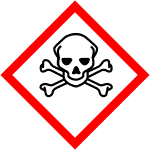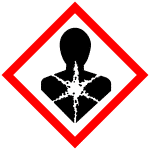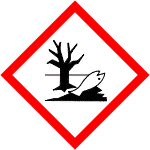硒化铅(II) ,Lead(II) selenide ,99.9% (metals basis)
产品编号:Bellancom-B432849| CAS NO:12069-00-0| 分子式:PbSe| 分子量:286.16
本网站销售的所有产品仅用于工业应用或者科学研究等非医疗目的,不可用于人类或动物的临床诊断或者治疗,非药用,非食用,
| 产品名称 | 硒化铅(II) |
|---|---|
| 英文名称 | Lead(II) selenide |
| CAS编号 | 12069-00-0 |
| 产品熔点 | 1065ºC |
| 产品密度 | 8.1 g/cm3 |
| 精确质量 | 288.90100 |
| 外观性状 | 灰色粉末和片,无气味 |
| 稳定性 | 常温常压下稳定 避免光,明火,高温。不溶于水,微溶于硝酸,具高毒性,怕湿气,具半导体性质。 |
| 储存条件 | 常温密闭,阴凉通风干燥 |
相关文档
化学品安全说明书(MSDS)
下载MSDS质检证书(COA)
相关产品
| 符号 |



GHS06, GHS08, GHS09 |
|---|---|
| 信号词 | Danger |
| 危害声明 | H301 + H331-H302 + H332-H360Df-H373-H410 |
| 警示性声明 | Missing Phrase - N15.00950417-P201-P260-P280-P304 + P340 + P312-P308 + P313 |
| 个人防护装备 | dust mask type N95 (US);Eyeshields;Gloves |
| 危害码 (欧洲) | Xn |
| 风险声明 (欧洲) | 20/22-33 |
| 安全声明 (欧洲) | 22-26-28-36/37/39-45 |
| 危险品运输编码 | UN 3288 |
| 包装等级 | II |
| 危险类别 | 6.1(a) |
|
Section 1: Product Identification Chemical Name:Lead (II) selenide (99.99%-Pb)PURATREM CAS Registry Number:12069-00-0 Formula:PbSe EINECS Number:235-109-4 Chemical Family:metal chalcogenides Synonym:none
Section 2: Composition and Information on Ingredients IngredientCAS NumberPercentACGIH (TWA)OSHA (PEL) Title Compound12069-00-0100%0.05mg/m3 (as Pb)0.05mg/m3 (as Pb) Section 3: Hazards Identification Harmful by inhalation and if swallowed. Chronic effects are severe and include headache, anemia, brain Emergency Overview: damage and reproductive disorders. May cause cancer. Danger of cumulative effects. Primary Routes of Exposure:Ingestion, skin, inhalation of dust. Eye Contact:May cause slight to mild irritation of the eyes. Skin Contact:May cause slight to mild irritation of the skin Inhalation:Large dust exposure may cause encephalopathy, then seizures, coma, and cardiorespiratory distress. Ingestion may lead to dizziness, abdominal cramps, vomiting, bloody diarrhea, metallic taste, weakness, and Ingestion: convulsions. Exposure may cause abdominal pain, loss of appetite, muscle weakness, headache, joint pain, metallic taste, Acute Health Affects: and encephalopathy (swelling of the brain). May cause harm to the unborn child. The chronic effects of lead poisoning include diarrhea, loss of appetite, muscle pain, headache, dizziness, Chronic Health Affects: anemia, brain damage, and reproductive disorders. Possible risk of impaired fertility. May cause cancer. NTP:No IARC:No OSHA:No SECTION 4: First Aid Measures Immediately flush the eyes with copious amounts of water for at least 10-15 minutes. A victim may need Eye Exposure: assistance in keeping their eye lids open. Get immediate medical attention. Wash the affected area with water. Remove contaminated clothes if necessary. Seek medical assistance if Skin Exposure: irritation persists. Remove the victim to fresh air. Closely monitor the victim for signs of respiratory problems, such as difficulty Inhalation: in breathing, coughing, wheezing, or pain. In such cases seek immediate medical assistance. Seek medical attention immediately. Keep the victim calm. Give the victim water (only if conscious). Induce Ingestion: vomiting only if directed by medical personnel. SECTION 5: Fire Fighting Measures Flash Point:not applicable Autoignition Temperature:no data Explosion Limits:no data Extinguishing Medium:carbon dioxide or dry powder. Fire fighters should be equipped with a NIOSH approved positive pressure self-contained breathing apparatus Special Fire Fighting Procedures: and full protective clothing. Hazardous Combustion andIf involved in a fire this material may emit toxic lead oxide dust. Decomposion Products: Unusual Fire or Explosion Hazards: No unusual fire or explosion hazards. SECTION 6: Accidental Release Measures Small spills can be mixed with vermiculite, sodium carbonate or other suitable non combustible adsorbent and Spill and Leak Procedures: swept up. SECTION 7: Handling and Storage Handling and Storage:No special precautions needed in handling and storage. SECTION 8: Exposure Controls and Personal Protection Eye Protection:Always wear approved safety glasses when handling a chemical substance in the laboratory. Skin Protection:Wear protective clothing and gloves. Consult with glove manufacturer to determine the proper type of glove. Ventilation:Handle the material in an efficient fume hood. If ventilation is not available a respirator should be worn. The use of respirators requires a Respirator Respirator: Protection Program to be in compliance with 29 CFR 1910.134. Ventilation:Handle the material in an efficient fume hood. Additional Protection:No additional protection required. SECTION 9: Physical and Chemical Properties Color and Form:gray to black pieces Molecular Weight:286.15 Melting Point:1065° Boiling Point:no data Vapor Pressure:not applicable Specific Gravity:8.1 Odor:none Solubility in Water:insoluble SECTION 10: Stability and Reactivity Stability:air and moisture stable Hazardous Polymerization:no hazardous polymerization Conditions to Avoid:none Incompatibility:oxidizing agents Decomposition Products:lead oxide and selenium oxide fumes SECTION 11: Toxicological Information RTECS Data:No information available in the RTECS files. Carcinogenic Effects:Carcinogen (as Pb) Mutagenic Effects:No data available Tetratogenic Effects:Reproductive effector (as Pb) SECTION 12: Ecological Information Avoid release to the environment. Very toxic to aquatic organisms. May cause long-term adverse effects in the Ecological Information: aquatic environment. SECTION 13: Disposal Considerations Disposal:Dispose of according to federal, state, and local regulations. SECTION 14: Transportation Shipping Name (CFR):Selenium compound, N.O.S. Hazard Class (CFR):6.1 Additional Hazard Class (CFR):NA Packaging Group (CFR):III UN ID Number (CFR):UN# 3283 Shipping Name (IATA):Selenium compound, Solid, N.O.S. Hazard Class (IATA):6.1 Additional Hazard Class (IATA):NA Packaging Group (IATA):III UN ID Number (IATA):UN# 3283 SECTION 15: Regulatory Information TSCA:Listed in the TSCA inventory. SARA (Title 313):See Category Codes N420 and N725 for reporting. Second Ingredient:none SECTION 16 - ADDITIONAL INFORMATION N/A |








 浙公网安备 33010802013016号
浙公网安备 33010802013016号